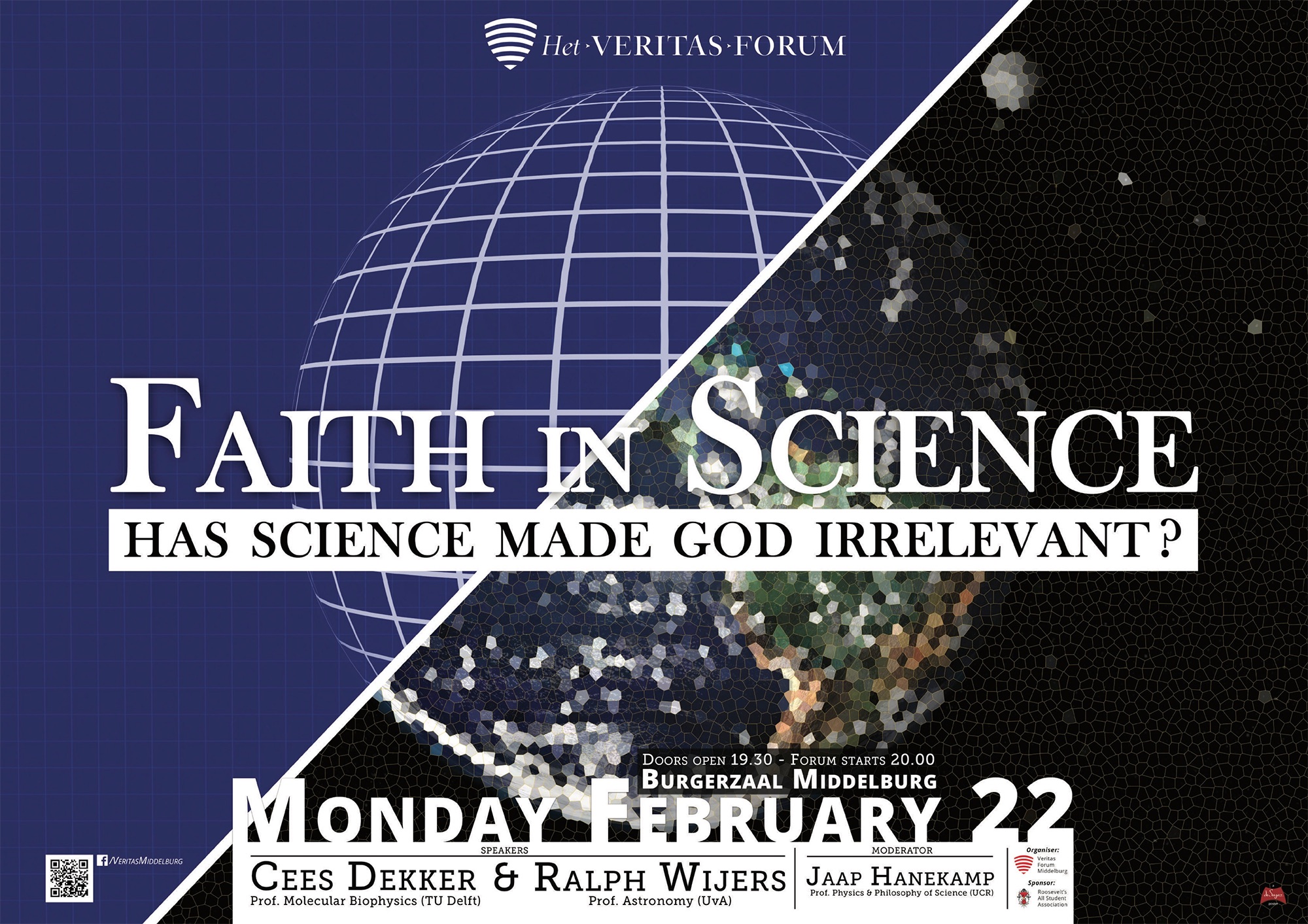By Marit Versteeg
On the 22nd of February, the annual Veritas Forum Middelburg was held in the Burgerzaal at UCR. This was the fifth time the Forum took place, and with over a hundred attendees the six dedicated students that organized it considered the event to be a great success.
The Veritas Forum Middelburg is part of the worldwide Veritas organization, which was founded at Harvard University in 1992, and has since then branched out into multiple countries. The organization “aims to provide a platform to engage students and faculty in discussions about the fundamental questions of life”. Veritas, which is the Latin word for ‘truth’, tries to explore these fundamental questions from diverse perspectives in their Forums, always including a Christian perspective. When Veritas first started out in Middelburg it was relatively unknown among students, however, over the years it has gained a lot more attention.
The evening was opened by a short speech from Anneleen van der Meer, chair of the Veritas Forum Middelburg team. After welcoming UCR students, faculty, and also people from outside UCR, she explained how Veritas attempts to fill the void between classroom academia and personal world views. This year’s theme was “Faith in Science”, and central to the debate was the question: Has science made God irrelevant? Cees Dekker (Prof. Molecular Biophysics, TU Delft) and Ralph Wijers (Prof. Astronomy, UvA) were invited to this debate, moderated by Jaap Hanekamp (Prof. Physics and Philosophy of Science, UCR).
Both prof. Dekker and prof. Wijers were posed three questions by the Forum beforehand: How do you approach science and why? What are your main arguments for theism/atheism as a plausible worldview? How do you personally integrate your critical thinking as a scientist with your deepest convictions about reality and human nature, and how do those convictions affect the way you live your daily life? They addressed these questions in their opening statements, as well as shortly introducing themselves.
For Cees Dekker, theist, the main driving force is having a very inquisitive nature. Looking at the world around him makes him wonder how and why it all works. Being brought up in a Christian family he was raised as a theist, but the concept of atheism has been deeply considered by him. In the end however, as he put it, it could not convince him. As for the conflict between science and religion, he considers this non-existent. He sees science as a methodology, a technique by which we can learn more about this world. Science is reliable, but also limited, and this is where religion comes in. Dekker argues that a helpful word in thinking about this is ‘worldview’. Everybody is shaped by how they were raised and the people that inspire them, which in turn create our worldviews: different starting points through which we look at the world. This does not create a conflict between religion and science as such, but a division between a theistic and atheistic worldview.
Ralph Wijers grew up in a Catholic family, but his faith waned in his early teens. He then became an atheist, stressing that an atheist is someone who does not believe in God, not someone who hates religion. Furthermore, he finds the universe to be absolutely fascinating. This is what drove him to studying science, more specifically astronomy. During the intellectual effort of trying to understand something, the journey to the answer is often nicer than actually getting to the answer. To him, there is indeed a clash between religion and science. “If it requires belief, then it is not science” is how he defines it. His motivation for a naturalistic approach to science is that he sees science as that which you can achieve by careful observation and logical deduction from that careful observation. This means that supernatural explanations to certain phenomena have no place in science.
After the opening statements, there was a so-called statement round for the audience. Every attendee received a red and a green slip of paper, which could be used to indicate either agreement or disagreement. The audience was invited to think about statements such as “My personal convictions are reflected in my academic work”, “I have had trouble uniting a personal conviction with a scientific fact”, “Religion comes in when science is at a loss for explanation” and “Only science can provide real knowledge”.
That last statement was used to then transition into a lively dialogue between the two professors. Sometimes jokingly, sometimes very seriously, and sometimes a bit heated, both men respected each other’s opinions, but also firmly stood their ground. This proved to be an interesting and entertaining way to end the debate. At the end of the night the audience was invited to join and continue the dialogue with prof. Wijers and prof. Dekker over a drink in Elliott.
If this article has sparked your interest, you can find more information on the team’s facebook page (Veritas Forum Middelburg), the website for Het Veritas Forum (nl.veritas.org) and the website for the Veritas Forum worldwide (global.veritas.org).
Marit Versteeg, Class of 2018, is interested in psychology and law, and is from Tholen, the Netherlands.

